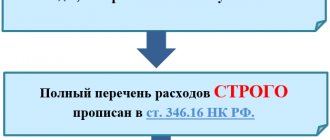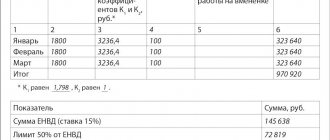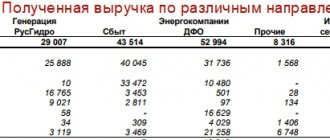Recognizing future expenses
The main task when accounting for BPR is to differentiate costs between expenses and assets, which are subsequently allocated into a separate object of the same name. Recognition of assets as deferred expenses is determined by its controllability by the company and the possibility of obtaining from it the economic benefits that it will bring if:
- used in the production of products/services for sale independently or together with other assets;
- exchanged for another asset;
- suitable for repaying obligations.
These features serve as a kind of indicator that allows you to attribute costs to BPR as an asset. As a rule, the company forms criteria for such attribution (usually by type/item of costs, taking into account industry characteristics) and is enshrined in the section defining the rules of accounting and accounting policies.
What applies to deferred expenses?
PBU defines two types of costs that can be recognized as part of the RBP:
- expenses spent on future construction. For example, materials sent to the construction site;
- licensed software.
In addition, there are specific costs that a company can recognize as a PBU, since none of the PBUs indicate how to account for them, but, logically, they should be written off gradually over a certain time. Such costs, for example, include the following:
- for preparation for work (maintenance of equipment and mechanisms) in seasonal industries;
- to master the production of the latest types of consumer goods;
- for land reclamation;
- for the transfer of company divisions;
- for product certification or compulsory/voluntary health insurance.
Deferred expenses in tax accounting
Tax legislation does not provide for the concept of BPR, but there is a special procedure for recognizing certain costs. For example, such expenses include financing for the development of natural resources, R&D, property insurance, and loss arising from the sale of depreciable assets (Articles 261,262,263,268 of the Tax Code of the Russian Federation).
The Tax Code of the Russian Federation establishes that expenses are recognized as such in the reporting period in which they arise from the terms of agreements or transactions. If the documents confirm that the costs relate to a number of periods, then the payer will have to take them into account when calculating the income tax for the entire specified period.
For example, a one-time payment for the right to use a brand is included in taxable expenses in equal shares for the duration of the license agreement.
If it is impossible to determine the period of occurrence of costs from the terms of the transaction, then the company has the right to independently establish the write-off period, having previously fixed the distribution procedure in the tax section of the accounting policy.
Disputes with the tax authorities
Very often, companies have a disagreement with the fiscal authorities regarding the deduction of VAT on expenses relating to several periods. Employees of the Ministry of Finance explained that collection amounts presented to a company for goods (works, services), the costs of which are not standardized for the purpose of calculating income tax, but are taken into account evenly over a certain period, are accepted for deduction in full in the generally established manner (Letter from 05.10.2011 No. 03-07-11/261). Thus, one should be guided by the rules that are prescribed in Article 271 of the Tax Code of the Russian Federation.
The upcoming expenses should not include the costs of licensing, product certification, vacation pay for employees due for the next month, transfers for the repair of fixed assets if there is no reserve for this in the company. These amounts must be taken into account in the current period even if they can significantly reduce the financial performance of the company or even lead to a loss. This conclusion can be made on the basis of Letter of the Ministry of Finance dated September 6, 2011 No. 07-02-06/166.
Irina Sidorova, expert at Calculation magazine
Postings to account 97 “Deferred expenses”
Since RBPs are an asset, the debit of account 97 records the amount of funds spent (for example, to obtain a certificate), and the credit records the write-off of these expenses in a certain time period (for example, the validity period of the document).
Deferred expenses are accounted for in accounting as follows:
- D/t 97 K/t 51 (60) – for the amount of costs accounted for as RBP;
- D/t 20 (26, 44, 91) K/t 97 – for parts written off in each period.
In the balance sheet, RBP are reflected as a separate item on line 1210 “Inventories” or line 1260 as part of other current assets. To confirm the timeliness and correctness of their write-off, companies periodically conduct an audit of deferred expenses , in which they reconcile the amount of turnover and account balances with the information from primary accounting documents.
GLAVBUKH-INFO
The formation of financial results is influenced to a certain extent by correct accounting of future expenses.Deferred expenses are expenses incurred by the organization in the previous and/or reporting periods, but subject to inclusion in the cost of products (works, services) in subsequent periods of the organization's activities.
Deferred expenses, in particular, include expenses related to:
- with mining and preparatory work;
- preparatory work for production due to its seasonal nature;
- development of new production facilities, installations and units;
- land reclamation and implementation of other environmental measures;
- repairs of fixed assets carried out unevenly throughout the year (when the organization does not create an appropriate reserve), etc.
Deferred expenses may also include:
- expenses related to product advertising;
- expenses for mandatory product certification;
- expenses for purchasing licenses, etc.
Only services or work already consumed can be recognized as future expenses.
To account for expenses incurred in the reporting period, but subject to inclusion in the cost of production in subsequent periods of the organization’s activities, active account 97 “Future expenses” is used. Accounting for deferred expenses is reflected in the debit of account 97 “Deferred expenses” and the credit of account 10 “Materials”, 70 “Settlements with personnel for wages”, 60 “Settlements with suppliers and contractors”, 76 “Settlements with various debtors and creditors” and etc.
Deferred expenses are subject to write-off in the manner established by the organization (evenly by month, in proportion to the volume of production, etc.) during the period to which they relate.
When using the first method and depending on the purpose, the expenses recorded on account 97 “Deferred expenses” are written off monthly in the share related to the reporting month to the debit of the accounts for accounting for production costs (accounts 20, 23, 25, 26) and /or account 44 “Sales expenses”.
The procedure chosen by the organization for writing off deferred expenses must be reflected in the organization's accounting policy as an element of it.
Analytical accounting for account 97 “Deferred expenses” is carried out for each type of expense.
Expenses for repairs of fixed assets unevenly carried out by the organization itself (when the organization does not create an appropriate reserve) are initially recorded as a debit to account 97 “Deferred expenses” in correspondence with the accounts for materials, labor costs, etc.
Then these expenses are written off monthly from account 97 “Deferred expenses” to the debit of the accounts for accounting for production costs (accounts 20, 23, 25, 26).
Let's assume that the organization has incurred advertising expenses related to future reporting periods (for example, full payment has been made for the use of a billboard for six months to advertise its products).
After installing the billboard, advertising services are considered consumed, and advertising costs should initially be accounted for by debiting account 97 “Deferred expenses” in correspondence with account 60 “Settlements with suppliers and contractors.”
Then, these expenses can be written off every month for six months in the share related to the reporting month, to the debit of account 44 “Sales expenses”, with subsequent attribution of these expenses to the cost of sales (subaccount 90-2).
For this example, accounting for advertising expenses and their write-off can be reflected in the following accounting entries:
No.
| Contents of business transactions | Corresponding accounts | ||
| Debit | Credit | ||
| 1 | Full payment was transferred to the advertising agency for advertising services provided according to settlement documents (including VAT) | 60 | 51 |
| 2 | The cost of advertising services provided, the results of which are used in subsequent reporting periods, is charged to deferred expenses (excluding VAT) | 97 | 60 |
| 3 | The amount of VAT claimed by the advertising service provider is reflected. | 19 | 60 |
| 4 | The entire amount of VAT paid on advertising services provided has been submitted for deduction. | 68-1 | 19 |
| 5 | Part of the cost of advertising services attributable to the expired reporting period (per month) was written off as selling expenses. | 44 | 97 |
| 6 | Advertising expenses for the past reporting period (month) were written off to cost of sales. | 90-2 | 44 |
Accounting for expenses for the acquisition of licenses to carry out certain types of activities is reflected in the debit of account 97 in correspondence with account 76 “Settlements with various debtors and creditors.”
The acquisition of licenses is carried out in accordance with the requirements of Federal Law dated 08.08.2001 No. 128-FZ “On licensing of certain types of activities”.
A license is a special permit to carry out a specific type of activity subject to mandatory compliance with licensing requirements and conditions, issued by a licensing authority to a legal entity or individual entrepreneur.
The list of activities for which licenses are required is established by Art. 17 of the above Law. According to this Law, the validity period of a license cannot be less than five years.
Expenses for the acquisition of licenses during their validity period are written off monthly in the share related to the reporting month in the debit of accounts for accounting for production costs, with subsequent attribution of these expenses to the cost of sales (subaccount 90–2 “Cost of sales”).
Accounting for the costs of purchasing licenses and their write-off to production cost accounts can be reflected with the following entries:
| No. | Contents of business transactions | Corresponding accounts | |
| Debit | Credit | ||
| 1 | Funds were transferred to pay for a license for a certain type of activity | 76 | 51 |
| 2 | The cost of the registered license was charged to deferred expenses. | 97 | 76 |
| 3 | The corresponding part of the costs of future periods is written off to the cost of production (part of the cost of the license is written off monthly in equal installments over the entire period of its validity, for example, for five years) | 20 | 97 |
| 4 | License expenses for the past reporting period were written off to cost of sales. | 90-2 | 44 |
At least once a year (usually before drawing up the annual report), an inventory of deferred expenses should be carried out.
The inventory commission, based on documents, establishes the amount to be reflected in the deferred expenses account and attributed to production costs and/or sales expenses (or to the relevant sources of funds of the organization) within a documented period in accordance with the calculations and accounting policies developed in the organization .
To take into account the results of the inventory of future expenses, a unified form No. INV-11 “Act of Inventory of Future Expenses” is used.
This form is drawn up in two copies by the responsible persons of the inventory commission based on the identification of the balances of the amounts listed in the corresponding account from the documents, signed, and one copy is transferred to the accounting department, the second remains with the commission.
The act reflects the total amount of costs (expenses) incurred in a given reporting period or not completely written off in previous periods, but relating to future reporting periods. The date of actual expenses incurred is also indicated if they are one-time (one-time), or the date of completion of work if they are related to work on the development of new equipment, production and other work carried out over a certain period of time.
When automated processing of data for accounting for the results of inventory of future expenses, form No. INV-11 is generated by computer technology on paper and computer media.
| < Previous | Next > |
Future expenses under the simplified tax system
Accounting for RBP is usually carried out by companies using OSNO. “Simplers” do not work with account 97. When switching to the simplified tax system, the balances of the RBP amounts (if they exist) are written off in full as expenses and reflected in the KUDiR. However, it is not always possible to take such expenses into account when calculating the single simplified tax. It depends on the moment of payment of these costs. If deferred expenses were paid before the transition to the simplified tax system, then they cannot be taken into account as expenses that reduce the tax base, since only the document paid for in the reporting period is recognized as an expense of a simplified enterprise.
If the company pays for the RBP after the transition to the simplified tax system, then it has the right to take these costs into account as expenses. True, this is only possible when the expenses are listed in Article 346.16 of the Tax Code of the Russian Federation.
VAT recovery
The second important question: is it necessary to restore the amount of tax previously accepted for deduction? The right to refund “input” VAT arises if the conditions defined by subparagraph 1 of paragraph 2 of Article 171 of the Tax Code of the Russian Federation are met: the acquired asset or service must participate in activities subject to VAT. Organizations using the simplified tax system are not payers of this tax, therefore the balance of future expenses will not be used in accounting (clause 2 of article 346.11 of the Tax Code of the Russian Federation).
Clause 3 of Article 170 of the Tax Code of the Russian Federation obliges companies, when switching to the simplified tax system, to restore VAT on the cost of goods (work, services) remaining on the balance sheet, as well as on the residual value of fixed assets and intangible assets. The transfer is subject to the fee accepted for deduction in classical accounting. These actions are carried out on the eve of a regime change. The restored amounts are included in the declaration for the last quarter in which the organization applied the general regime. In this case, the tax amount is taken into account as part of other expenses (Article 264 of the Tax Code of the Russian Federation).
The upcoming expenses should not include the costs of licensing, product certification, vacation pay for employees due for the next month, transfers for the repair of fixed assets if there is no reserve for this in the company.









